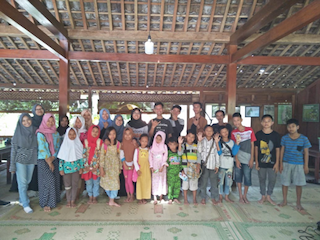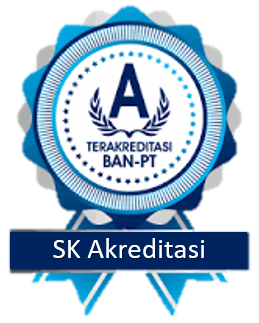You are here
INTRODUCTION AND TEACHING OF ENVIRONMENTAL SCIENCE BASED ON BASIC ENGLISH LEARNING FOR CHILDREN OF JATIMULYO KULONPROGO AS A EFFORTS TO ESTABLISH ECOEDU-TOURISM BASED TOURISM VILLAGE

Jatimulyo tourist area, Kulon Progo is one of the very potential tourist destinations in the southern region of Yogyakarta Special Region Province. The tourist areas in Jatimulyo Tourism Village offer a variety of tourism objects, ranging from natural attractions to culinary tourism. The natural attractions in this village include Mudal River Ecotourism, KembangSoka Waterfall, and many more. As for the culinary tourism which was developed in the form of coffee drinks and ant sugar products. Aside from nature tourism, Jatimulyo Tourism Village also has other resources originating from plantations, animal husbandry, and timber commodities which are very useful to boost the economy of local residents. From the plantation sector, the main commodities produced are coffee, cocoa, vanilla, cloves, and kepayang. Meanwhile, wood commodities produce a variety of raw wood products from teak, mahogany, rosewood, and others. Jatimulyoyang Village resources can be used as a tourist attraction does not stop there. Various wild animals such as birds, dragonflies, butterflies, to kanceng (a type of bee) are the main attraction for tourists, especially animal lovers. So no wonder if Jatimulyo Tourism Village is used as an object of observation and research of these animals.
All potentials in Jatimulyo Tourism Village are able to make this village an ideal tourist destination and have local wisdom insight if its resources are managed and utilized properly. One tangible manifestation of the management and utilization of resources in Jatimulyo Village is the formation of the WANAPAKSI community. WANAPAKSI Community is a community in Jatimulyo Village which facilitates farmers and local residents to improve their lives while managing village resources through the development of agroforests (community forests), conservation of natural resources especially for local flora and fauna, joint production of plantation products. regeneration of the environment, etc.
Utilization and management of natural resources in the Jatimulyo Tourism Village has indeed become the main focus to make this village an ideal, quality, and edu-tourism-oriented tourist destination. However, this goal needs to be supported by the ability of local residents to introduce or promote the tourist village. Without good promotion, tourist destinations that have been developed in such a way will not be well known by tourists. Jatimulyo Tourism Village residents have the minimum ability to entertain tourists and explain briefly to them about the ins and outs of the tourist destinations that are there. Moreover, tourists who come to Jatimulyo Tourism Village are not only from domestic tourists but also from foreign countries. This is a challenge as well as a good opportunity for the residents of Jatimulyo Tourism Village because they can introduce even wider tourism destinations that are there and also practice the ability to promote and speak English. This good opportunity seems to be covered by the obstacles felt by the people there. One obstacle that occurred was the lack of English language skills in the Jatimulyo Tourism Village community. The ability to speak English becomes important considering that tourists who come also come from foreign countries. If they do not master English even for basic things in order to introduce their villages, promotion cannot be carried out properly. Therefore, the local community together with Mr. Rio Christy Handziko, S.Pd.Si., M.Pd. as a lecturer majoring in biology education at Yogyakarta State University, initiated English learning as a provision to guide tours for children in the Jatimulyo KulonProgo Tourism Village as a form of developing an ideal, quality, insightful local tourism-based tourism village. Children are chosen as learning subjects because they are still actively learning English in school. In addition, a productive age also supports agility and creativity for children to absorb and develop the material they get from learning English. Whereas for the instructor or trainer of this activity are 10 undergraduate students of the Department of Biology of international class Yogyakarta State University.
Teaching activities are divided into 2 meetings. The first meeting was held on Friday, May 3, 2019 and the second meeting was held on Sunday, May 5, 2019. The first meeting was attended by 20 participants consisting of elementary school age children to junior high school. The material presented in the form of ways to introduce themselves in English and expressions used in English. The second meeting was attended by 16 participants consisting of children from elementary school to high school. The material presented in the form of a review of the first meeting material and more focused to add vocabulary or vocabulary
Sistem Informasi
Kontak Kami
Program Studi Biologi
(Gedung Baru FMIPA lt III depan Masjid Mujahidin Karangmalang)
FMIPA Universitas Negeri Yogyakarta
Kampus Karangmalang Yogyakarta 55281
email : biologi@uny.ac.id
Copyright © 2026,

